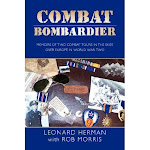I'm currently working on two shorter writing projects and one long one. 'Short' is a relative term with me, because I tend towards perfectionism and hate letting go of a story until I'm sure it's perfect. The first of these is a future magazine article, to be submitted to aviation and WWII magazines. This story is about a day when the Swiss shot down two American B-17s, killing most of both crews. It is an amazing and troubling story on many levels. I originally wrote about it in my book, but this summer, I had a chance to visit Norris King, one of the survivors of that day, while in Denver, Colorado. We had a long talk and I took lots of photos. I posted a short copyrighted updated on this weblog after the visit, which you can read here: http://untoldvalor.blogspot.com/2007/08/norris-king-shot-down-by-swiss.html
 Marilyn King, Norris King, and myself during our visit this summer in Arvada, Colorado.
Marilyn King, Norris King, and myself during our visit this summer in Arvada, Colorado.
Norris and his wife Marilyn were kind enough to make copies of some of the photos from his collection. I am including one of them here, of Norris as a young waist gunner upon graduation from gunnery school.
 Norris King, graduation from gunnery school
Norris King, graduation from gunnery school
------------------------------------------------------------------------------------

 Joe's map of Wake Island
Joe's map of Wake Island

 Joe's POW address book from the camp.
Joe's POW address book from the camp.

The POW Bulletin was sent to family members of POWs to keep them posted on news from the camps.
 The letter informing Joe's family of his death on Wake Island.
The letter informing Joe's family of his death on Wake Island.
 Joe McDonald, front row, second from left, shortly after the war ended, with other POWs and the friendly Japanese guard.
Joe McDonald, front row, second from left, shortly after the war ended, with other POWs and the friendly Japanese guard.
After the war, Joe returned, married, raised a family, and lived his life. He passed away in the eighties. His wife and son, Fr. Joe, put together a scrapbook, from which these artifacts were copied. Joe's complete POW papers are in a university library in Nevada.

A postcard sent by Joe to the States.
 A sad postcard, the back written in Japanese, tells of a young soldier's missing his family. We are uncertain when or how Joe got this card.
A sad postcard, the back written in Japanese, tells of a young soldier's missing his family. We are uncertain when or how Joe got this card.

We are also unsure what these cards are. However, they seem to be American propaganda leaflets dropped or given to the Japanese civilians to encourage them to surrender. Perhaps they were left over, as these were mailed back to the States by Joe after his release and after the war was over.
 Marilyn King, Norris King, and myself during our visit this summer in Arvada, Colorado.
Marilyn King, Norris King, and myself during our visit this summer in Arvada, Colorado.Norris and his wife Marilyn were kind enough to make copies of some of the photos from his collection. I am including one of them here, of Norris as a young waist gunner upon graduation from gunnery school.
 Norris King, graduation from gunnery school
Norris King, graduation from gunnery school------------------------------------------------------------------------------------

The second shorter story I am working on just came about yesterday. My parish priest at Christ the King Roman Catholic Church here in Idaho Falls, Fr. Joe McDonald, had mentioned in a homily several years back that his dad had been in World War Two. As a result, about six weeks ago I gave Father Joe a copy of my book as a gift. A few weeks later he caught me on the way out of Mass and said he had some stuff to show me about his father's experiences. We finally got together yesterday afternoon for a long talk about his dad's experiences.
It turns out Fr. Joe's dad, also named Joe McDonald, went to Wake Island to work as a construction worker. Because his father worked at the Reno, Nevada State Journal, the paper hired young Joe on as a correspondant, charged with filing stories of interest from Wake Island.
Joe's early days on Wake were enjoyable. He drew a map of the island, noting where the sharks, octopii and other sea creatures were located offshore. He worked hard and filed the occasional story.
 Joe's map of Wake Island
Joe's map of Wake IslandAfter Pearl Harbor, Wake Island was under attack from the Japanese Navy. All of a sudden, Joe was on the front lines of a brutal invasion attempt. He volunteered to help man an anti-aircraft gun and hunkered down.
On December 20, Joe filed this report from Wake: "Wake Island has suffered 11 bombings and one shelling since the beginning of the war...The Marine Corps and contractors personnel stationed on the island have successfully repelled all attacks bringing down around nine planes, four surface craft, one submarine and one patrol bomber...All is under control and the island is holding out fine. Total casualties to date: (approximately 65 dead, 60 injured)."

Joe ended the dispatch with: "This is a rush job, Frank--make what you can of it."
 The last dispatch from Wake Island, written by Joe McDonald.
The last dispatch from Wake Island, written by Joe McDonald.
 The last dispatch from Wake Island, written by Joe McDonald.
The last dispatch from Wake Island, written by Joe McDonald.He handed the dispatch to the crew of a PBY Catalina patrol bomber, which had landed that day. At 0700 the next morning, December 21, the PBY took off.
Less than two hours later, the Japanese assault on Wake began. On December 24, Christmas Eve, Wake Island fell to the Japanese.
Joe was now a Prisoner of War.
The POWs were loaded onto a ship called the Nita Maru in January for shipment to hostile territory. Upon boarding the ship, Joe was given a typed paper telling him the regulations for prisoners on board ship. Almost every failure to obey orders would result in death, including talking without permission, walking or moving without orders, carrying unecessary baggage, taking extra food, or using more than two blankets.
Joe ended up in Section No. 8, Barrack No. 4 at Shanghai War-Prisoner's Camp in Shanghai, China. He would be imprisoned until the end of the war in August, 1945.
 Joe's POW address book from the camp.
Joe's POW address book from the camp.
The POW Bulletin was sent to family members of POWs to keep them posted on news from the camps.
On December 24, 1941, Rear Admiral B. Moreell wrote to Joe's parents with bad news. "It is with sincere regret that it is my sad duty to inform you of the death of your son, Mr. Joseph McDonald, as the result of enemy action on Wake."
 The letter informing Joe's family of his death on Wake Island.
The letter informing Joe's family of his death on Wake Island.A body was returned to the grieving family, a funeral was held, and the remains of Joe McDonald were interred in a cemetery in Reno. However, several months later, the military realized that the Joe McDonald killed on Wake was a different Joe McDonald. A second, apologetic letter was sent. The remains were exhumed and moved to Cody, Wyoming for re-burial with the correct family.
How devastating this ordeal must have been for both families.
In the camp, the men worked together to survive. Joe always scraped out the burned rice in the bottom of the cooking pots and together with his friends, they ate it. He credited this with helping him stay alive, and today, Fr. Joe remembers how the family ate rice nearly every meal growing up. His dad insisted the rice be burned brown a little on the bottom.
The POWs were occasionally helped by a kindly Japanese guard. After the war, some of the surviving POWs sat for a portrait with this man, and many years later, this Japanese guard sent Joe a Christmas card.
 Joe McDonald, front row, second from left, shortly after the war ended, with other POWs and the friendly Japanese guard.
Joe McDonald, front row, second from left, shortly after the war ended, with other POWs and the friendly Japanese guard.After the war, Joe returned, married, raised a family, and lived his life. He passed away in the eighties. His wife and son, Fr. Joe, put together a scrapbook, from which these artifacts were copied. Joe's complete POW papers are in a university library in Nevada.
Interestingly, Joe had the headstone from his grave put in his back yard, where he enjoyed it as a conversation piece for many years. He also said he enjoyed reading his obituary and hearing all the nice things people had to say about him at his funeral in 1942.

A postcard sent by Joe to the States.
 A sad postcard, the back written in Japanese, tells of a young soldier's missing his family. We are uncertain when or how Joe got this card.
A sad postcard, the back written in Japanese, tells of a young soldier's missing his family. We are uncertain when or how Joe got this card.








1 comment:
A fascinating post Rob.
Post a Comment